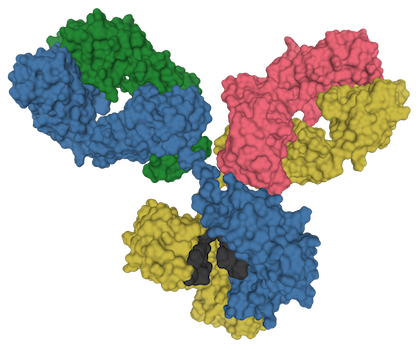The Short Report - May 31, 2023: Accelerating innovative medicine; a new hub for collaborative northern & Arctic research, celebrating Mitacs entrepreneurs, and more.

HEALTH RESEARCH & FUNDING
AbCellera Biologics (Vancouver) has received a combined investment of $300 million in government funding to upgrade its Vancouver facilities and develop a $701-million biotechnology campus featuring a preclinical antibody-development complex. The Government of Canada will be committing the lion’s share of the funds ($225 million through the Strategic Innovation Fund), while the Government of British Columbia will contribute $75 million. Key components of the project include:
- A biotechnology campus for bringing new antibody-based medicines to the clinic, and patients, faster;
- Up to 17 drug development programs for new antibody-based medicines, with an initial focus on cancer and immune diseases;
- Conducting multiple Phase 1 clinical trials in British Columbia and across Canada.
The Canadian Institutes for Health Research is investing $1.25 million through the Mental Health in the Early Years Initiative to support the Infant and Early Mental Health (IEMH) Care Pathways project led by Dr. James Reynolds, (CEO, Kids Brain Health Network, Burnaby) and Dr. Chaya Kulkarni (Director of Infant & Early Mental Health Promotion for Sick Kids Hospital, Toronto). The funding aims to enhance understanding and improve evidence-based interventions for young children and their caregivers and will implement the IEMH Care Pathways model over five years to promote, prevent, and treat early childhood mental health, addressing the lack of a systematic approach to supporting mental health needs in Canada. Kids Brain Health
Health Canada is providing funding to Brain Canada that will be matched by contributions from sponsors, donors, and partners to improve brain health. Four grants have been awarded to researchers at Western University, the Douglas Hospital Research Centre, and the University of Calgary thorough the Canada Brain Research Fund Program, which has committed an overall federal investment of $200 million to Brain Canada to date. The funding aims to advance treatments for neurological illnesses and enhance understanding of brain disruptions. This round of awardees include Dr. Emma G. Duerden, Western University ($1,277,902 in total funding to develop a platform for brain monitoring that also serves as an alternative data collection method for patients who cannot undergo traditional imaging); Dr. Lisa Saksida, Western University (total funding of $1,425,000 to enable new approaches for developing treatments for neurological illnesses by using cognitive tests for mice that are identical to those used in human patients); Dr. Sylvia Villeneuve, Douglas Hospital Research Centre in Montreal (total funding of $2,280,000 to establish the Canadian Alzheimer's Prevention Data Repository and Sharing Platform, the first Canadian platform to collect and share data on preclinical Alzheimer's disease at no cost), and Dr. Signe Bray, University of Calgary (total funding of $5,605,000 to develop a platform that understands how brain development in children is affected by injuries, exposures, and genetics, and how these disruptions contribute to behavioural and mental health challenges). Health Canada | Backgrounder
The Government of Canada is investing $6.35 million to support 13 teams across Canada to research mpox and other zoonotic disease threats. At the Université de Montréal, researchers will use the funding to develop an epidemiological model of mpox; the University of British Columbia and the BC Centre for Disease Control will assess the effectiveness of public health campaigns; the University of Saskatchewan's Vaccine and Infectious Disease Organization will analyze mpox transmission and host responses to infection; University of Toronto researchers will assess the risk of a poxvirus outbreak in the agricultural sector, and York University will receive funding to better predict future outbreaks of zoonotic diseases. CIHR | VIDO
Two research projects at Concordia University have received nearly $1 million in funding through Discovery Horizons grants administered by the Natural Sciences and Engineering Research Council. The first project, led by Dr. Dajana Vuckovic, aims to develop new sampling devices to accurately measure hard-to-measure compounds in the human body, such as oxylipins and peptide hormones. The second project, led by Dr. Wen-Fang Xie, focuses on creating an autonomous robot capable of generating ultrasound images of patients' hearts. The robot aims to improve access to heart imaging services, especially in remote areas where there is a shortage of physicians. Concordia
COLLABORATION & INNOVATION
The Government of Canada and the Government of Québec have each announced $8 million in additional funding to complete the financing required to build a science complex that will serve as a North American hub for collaborative northern and Arctic research. The Institut nordique du Québec (INQ) is slated to open in 2026 and will house analytical labs as well as a logistics centre for preparing maritime and land missions to the Arctic. It will facilitate large-scale interdisciplinary research projects and encourage collaboration between universities, businesses, and government organizations. ULaval
Maritime Launch Services (Halifax) has secured commitments with an undisclosed international space technology client for launching orbital transfer vehicles (OTVs) from Spaceport Nova Scotia, Canada's first commercial launch site, from 2025 onwards. The agreement, if fully realized, is valued at over $1 billion in revenue. Maritime Launch says its client is a leader in space logistics and transportation and has a track record of space-proven technologies and successful missions, enabling service providers to streamline satellite launch, across-orbit transportation, on-orbit servicing and refueling, and end of mission disposal. Maritime Launch Services
PwC Canada will invest $200 million over the next three years to expand its artificial intelligence (AI) offerings and leverage generative AI to help clients transform their businesses. The investment includes a strategic partnership with Microsoft, utilizing OpenAI's GPT-4/ChatGPT and Microsoft's Azure OpenAI Service. PwC Canada plans to upskill its workforce and accelerate STEM talent hiring while focusing on responsible AI practices to build trust and accountability. Cision
The Applied Genomics Centre (AGC) at Kwantlen Polytechnic University (Surrey), has undergone expansion and received new funding of $1 million from the B.C. Knowledge Development Fund, bringing total funding to over $9 million. The funding will allow it to acquire genomics equipment and build a team of 30 researchers to support various agriculture projects, including a partnership with Thompson Rivers University and a ranch in Kamloops to develop heat-resistant beef cattle. The AGC is focused on genetics research for the B.C. agricultural sector; students from health science, biology, horticulture, and brewing programs will benefit from hands-on experience and training at the centre. KPU| Surrey Now Leader
VC FUNDING
Toronto-based startup BenchSci has raised $95 million in a Series D funding round led by Al Gore's Generation Investment Management. BenchSci uses artificial intelligence (AI) to help pharmaceutical companies accelerate R&D. The company's AI-powered drug-discovery platform uses machine learning models to analyze text and images, helping scientists speed up the pre-clinical drug-development process. Existing investors for this funding round include Inovia Capital, TCV, Golden Ventures and F-Prime Capital. The most recent funding brings BenchSci’s total funds raised to $218 million. BenchSci
Montreal-based ESG data management software company Novisto has raised $27 million in a Series B funding round led by Inovia Capital. The round includes new investments from Portage and SCOR Ventures, and participation from existing investors White Star Capital and Diagram Ventures. Novisto will use these funds to accelerate its product development and market expansion. Novisto
Artificial intelligence (AI) startup Cognosys, which creates web-based AI agents to serve as personal assistants, has secured $2 million in a seed round. The round was led by Sangeen Zeb at Google Ventures , with participation from Guillermo Rauch (CEO at Vercel), Amjad Masad (CEO at Replit), Aidan Gomez (CEO at Cohere), Ivan Zhang (CTO at Cohere), Untapped VC, and managing partner Yohei Nakajima (BabyAGI). Cognosys will use the funds to accelerate its growth, expand its team, refine its platform, and enhance its product’s AI capabilities. Cognosys
FUNDING OPPORTUNITIES
A new intake of the Agricultural Clean Technology (ACT) Program – Adoption Stream will open on June 1, providing non-repayable grants between $25,000 and $2 million to help producers purchase and install equipment that reduces greenhouse gas (GHG) emissions or provides other associated environmental benefits. The ACT Program is focused on three priority areas: green energy and energy efficiency; precision agriculture; and bioeconomy solutions. Agriculture & Agri-Food Canada
Brain Canada, in partnership with the Krembil Foundation and Women's Brain Health Initiative, has launched the Basics of Better Mental Health Program to fund experimental research that aims to address a gender gap in basic mental health research and gain insight into the causes, onset, and treatment of mental illnesses. A total of $3.3 million will be invested in three research teams, with each team receiving a grant of $1.1 million. The deadline for receiving full applications is September 8th, 2023. Brain Canada
Canada’s three research funding agencies, the Social Sciences and Humanities Research Council, the Canadian Institutes of Health Research (CIHR), and the Natural Sciences and Engineering Research Council (NSERC) are extending their pilot committee in support of interdisciplinary research for a third year. The Tri-agency Interdisciplinary Peer Review Committee provides an option for researchers working in interdisciplinary research to direct their applications to a committee of experts from across the social sciences, humanities, natural sciences, engineering and health sciences. Individuals applying for SSHRC Insight Grants and Insight Development Grants, CIHR Project Grants, and NSERC Discovery Horizons funding opportunities can direct their applications to be reviewed by this interdisciplinary peer review committee. SSHRC
THE GRAPEVINE
Dr. Rafaela Andrade, Dalhousie University’s Department of Biomedical Engineering and co-founder/CEO of Myomar Molecula (Halifax) and Dr. Irsa Wiginton, Queen’s University Cancer Research Institute, have been awarded the Outstanding Entrepreneur Award and Global Impact Entrepreneur Award, respectively, at the eighth annual Mitacs Entrepreneur Awards ceremony in Waterloo. The awards recognize up-and-coming researchers-turned-entrepreneurs who transformed discoveries into businesses affecting the lives of Canadians. Andrade’s company has developed the world’s first urine strip test for measuring muscle loss, while Wiginton has given oncologists a way to monitor tumours and optimize personalized treatment with a simple, routine blood test. Other Mitacs awardees include Dr. Jeremy Wang, University of Waterloo and COO of Ribbit, who won the Change Agent Entrepreneur for developing Canada's first autonomous cargo airline; Nanette Sene, Polytechnique Montréal/CEO of Juno Technologies, who received the Social Entrepreneur award for developing a wearable device that combines heat with microelectronics to quickly alleviate muscle cramps and menstrual pain; and Dr. Kevin Kung, researcher in the Biomass and Bioenergy Research Group at the University of British Columbia and CTO of Takachar, who received the Environmental Entrepreneur award for his small-scale, portable system converting crop and forest residues (biomass) into higher value bioproducts, such as fertilizer blends, chemicals, and biofuels. Mitacs | Queen's | Dalhousie
Lori-Ann Kaminski, the Manitoba Crop Alliance's research program manager, cereal crops, is the new president of the Canadian Wheat Research Coalition (CWRC) and will be the key contact for external stakeholders. The CWRC, a collaboration between the Alberta Wheat Commission (AWC), Saskatchewan Wheat Development Commission, and Manitoba Crop Alliance, has undergone changes, with the Manitoba Crop Alliance now taking on administrative responsibilities from the AWC. CWRC
Events For Leaders in
Science, Tech, Innovation, and Policy
Discuss and learn from those in the know at our virtual and in-person events.
See Upcoming Events
You have 0 free articles remaining.
Don't miss out - start your free trial today.
Start your FREE trial Already a member? Log in
By using this website, you agree to our use of cookies. We use cookies to provide you with a great experience and to help our website run effectively in accordance with our Privacy Policy and Terms of Service.





